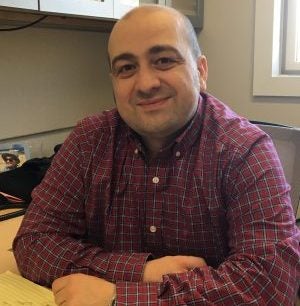- Research Assistant Professor, Biomedical/Pharm Sciences
- Ryan Research Assistant Professor of Neuroscience
- Phone: 401-874-9280
- Email: gcoppotelli@uri.edu
Biography
Giuseppe Coppotelli, Ph.D. investigates the underlying molecular mechanisms of the aging process and its role in the development of neurodegenerative disease. As part of the Ross Lab, he is particularly focused on the contribution and interconnectedness of protein homeostasis deregulation and mitochondrial dysfunction in the aging brain and how these might translate to chronic inflammation and contribute to dementias such as Alzheimer’s disease.
His research aims to better understand how and why we age in order to develop therapies to counteract age-related function alterations occurring at the cell, tissue, and organ level, as well as to identify strategies to combat the development of conditions such as metabolic and neurodegenerative diseases, which are more common with advanced age.
Prior to joining URI in January 2020, Dr. Coppotelli completed his post-doctoral training at the Sinclair lab at Harvard Medical School and the Karolinska Institutet in Stockholm, Sweden. He received both his M.S. in biological science cum laude and Ph.D. in molecular endocrinology from the University of Rome.
Dr. Coppotelli co-mentors graduate and undergraduate trainees in the Ross lab.
Read a Q&A with Dr. Coppotelli.
Grants / Awards
August 2024 Drs. Ross and Coppotelli received a two-year, $433,125 NIH grant to characterize a new mouse model of mitochondrial dysfunction. The model will allow researchers to isolate mtDNA mutations within single tissues to more accurately understand the impacts on different health and disease states.
January 2023 Dr. Coppotelli is principal investigator on a URI College Innovative Seed Grant to study mitochondrial DNA mutations.
January 2022 Drs. Coppotelli and Ross are primary investigators on a $179,500 grant from the Champlin Foundation to acquire high-precision Laser Capture Microdissection technology that enables researchers to isolate and study individual cells or cell structures in tissue, cell, and other biological samples. Its use will provide essential workforce training to neuroscience, pharmacy, engineering, biological science, and bioinformatics students.
March 2021 Dr. Coppotelli was awarded a grant from the Rhode Island Foundation to collect preliminary data for a project focused on the role of a novel protein in brain homeostasis and neurological disorders.
June 2020 Drs. Coppotelli and Ross are awarded a $95,000 grant from the Fred M. Roddy Foundation to fund innovative behavioral equipment and an essential tissue preparation instrument.
Selected Publications
- Mitochondrial Dysfunction: A Key Player in Brain Diseases. Bartman S, Coppotelli G, Ross JM*. Current Issues in Molecular Biology, February 2024
- Mitochondrial Dysfunction and Protein Homeostasis in Aging: Insights from a Premature-Aging Mouse Model. Ross JM, Olson L, Coppotelli G. MDPI, January 2024
- Gaspar L, Bartman S, Coppotelli G, Ross J. Effect of apparatus characteristics on anxiety-like behavior in young adult and old mice of both sexes assessed by the elevated plus maze assay. Frontiers in Behavioral Neuroscience, August 2023
- Gaspar L, Bartman S, Coppotelli G, Ross J. Acute Exposure to Microplastics Induced Changes in Behavior and Inflammation in Young and Old Mice. International Journal of Molecular Science, August 2023
- “Mitochondria in Aging and Diseases: Partie Deux,” Tobias-Wallingford H, Coppotelli G, Ross JM. International Journal of Molecular Sciences, June 2023
- Yang J-H et al (including Ross JM, Coppotelli G). Loss of epigenetic information as a cause of mammalian aging. Cell, Jan 2023
- Amorim J, Coppotelli G, Rolo A, Palmeira C, Ross JM, Sinclair D. (2021). Mitochondrial and metabolic dysfunction in ageing and age-related diseases. Nature Reviews Endocrinology, Feb 2022.
- Potts E, Coppotelli G, Ross JM. (2020) Histological-based stainings using free-floating method. Journal of Visualized Experiments. Jove, DOI: 10.3791/61622.
- Adelöf J, Ross JM, Lazic SE, Zetterberg M, Wiseman JW, Hernebring M. (2019). Conclusions from a behavioral aging study on male and female F2 hybrid mice on age-related behavior, buoyancy in water-based tests, and an ethical method to assess lifespan. Aging,Sep 11;11(17):7150-7168. PubMed
- Ross JM, Coppotelli G, Branca RM, Kim KM†, Lehtiö J, Sinclair DA, Olson L. (2019). Voluntary exercise normalizes the proteomic landscape in muscle and brain and improves the phenotype of progeroid mice. Aging Cell, Dec;18(6):e13029. PubMed
- Ross JM, Coppotelli G, Olson L (Eds). (2016).Mitochondrial Dysfunction in Ageing and Diseases. International Journal of Molecular Sciences. Basel: MDPI AG.ISBN: 978-3-03842-251-8
- Ross JM, Olson L, Coppotelli G. (2015). The Mitochondrial and Ubiquitin Proteasome Systems in ageing and disease: Two sides of the same coin? International Journal of Molecular Sciences, Special Issue, “Mitochondrial Dysfunction in Ageing and Diseases”. 16(8):19458-76. DOI:10.3390/ijms160819458 PubMed
- Ross JM, Coppotelli G, Hoffer BJ, Olson L. (2014). Maternally transmitted mtDNA mutations cause reduced lifespan. Scientific Reports,4, 6569; DOI:10.1038/srep06569. PubMed
- Ross JM, Stewart JB, Hagström E, Brené S, Mourier A, Coppotelli G, Freyer C, Lagouge M, Hoffer BJ, Olson L, Larsson NG. (2013). Germline mtDNA mutations aggravate ageing and can impair brain development. Nature, Sep 19; 501(7467): 412-5. PMID:23965628 PubMed
- Ross JM, Öberg J, Brené S, Coppotelli G, Terzioglu M, Pernold K, Goiny M, Sitnikov R, Kehr J, Trifunovic A, Larsson NG, Hoffer BJ and Olson L. (2010). High brain lactate is a hallmark aging and caused by a shift in the lactate dehydrogenase A/B ratio. Proceedings of the National Academy of Sciences of the United States of America, Nov 16; 107(46): 20087-92. PMID: 21041631 PubMed

